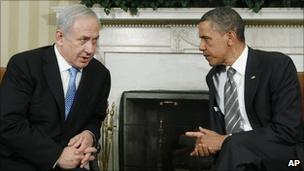Netanyahu makes himself clear: No basis for new talks
- Published
- comments

Mr Netanyahu spoke like a hawk, despite the talk of peace
The president sat with his body tensed, one hand gripping the side of his chair, the other clutching his chin, like a stoic enduring punishment.
The most powerful politician in the world was being lectured by the Israeli prime minister in his own home, his own office.
Barack Obama's officials looked slightly sick as Benjamin Netanyahu quietly and deliberately unleashed a tour de force against the leader of the country that is Israel's best friend in the world.
He set out with utmost clarity his objections to the president's plans for peace and the obstacles to any deal.
Mr Obama hadn't even repeated, in front of the assembled media, his subtle shift of policy, in which he called on Thursday for a future Palestinian state to be based on the borders of 1967, before the Six Day War. He was bland, assuring friendship.
"Obviously there are some differences between us in the precise formulations and language, and that's going to happen between friends," he said.
"But what we are in complete accord about is that a true peace can only occur if the ultimate resolution allows Israel to defend itself against threats, and that Israel's security will remain paramount in US evaluations of any prospective peace deal."
Nevertheless, Mr Netanyahu watched him like a hawk. And then he spoke like one, despite the talk of peace.
"Israel wants peace. I want peace," he said.
"What we all want is a peace that will be genuine, that will hold, that will endure. We both agree that a peace based on illusions will crash eventually on the rocks of Middle Eastern reality, and that the only peace that will endure is one that is based on reality, on unshakeable facts."
The Israeli prime minister then shredded the president's plan.
"While Israel is prepared to make generous compromises for peace, it cannot go back to the 1967 lines," he said, "because these lines are indefensible, because they don't take into account certain changes that have taken place on the ground, demographic changes that have taken place over the last 44 years.
"Remember that before 1967, Israel was all of nine miles wide. It was half the width of the Washington Beltway. And these were not the boundaries of peace. They were the boundaries of repeated wars, because the attack on Israel was so attractive."
That was not all he said. Peace was not possible while Hamas was at the top table. And there could be no right of return for Palestinians to Israel. Then an extraordinary, passionate reminder of Jewish history.
"We've been around for almost 4,000 years," Mr Netanyahu said. "We've experienced struggle and suffering like no other people. We've gone through expulsions and pogroms and massacres and the murder of millions. But I can say that... even at the nadir of the Valley of Death, we never lost hope and we never lost our dream of re-establishing a sovereign state in our ancient homeland, the land of Israel.
"And now it falls on my shoulders as the prime minister of Israel, at a time of extraordinary instability and uncertainty in the Middle East, to work with you to fashion a peace that will ensure Israel's security and will not jeopardise its survival. I take this responsibility with pride but with great humility, because, as I told you in our conversation, we don't have a lot of margin for error. And because, Mr President, history will not give the Jewish people another chance."
Mr Obama was staring intently at the prime minister through out this uncomfortable experience. Then, with a brisk hand shake it was all over.
There was bad blood between the two men before this and the encounter is hardly likely to improve their relationship.
The Israeli prime minister couldn't be clearer: At the moment there is no basis for new talks and he won't buy the president's plans.
The very optimistic might regard it as a clearing of the air, the re-stating of Israel's bottom line. But there was no hint of compromise.
There is a gulf yawning between the policy of Israel's leader and the plan put forward by the president of its closest, most vital ally.